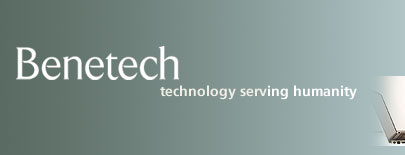
Open-source plan could aid torture victims
By Lisa M. Bowman
Special to CNET News.com
April 9, 2001, 12:10 p.m. PT
From a cramped office that used to be the drug dispensary on the retired Moffett Field military base in Mountain View, Calif., Jim Fruchterman is plotting his next project to save the world.
Already, the engineer and entrepreneur has invented a reading machine for the blind that's used by thousands of people, and he's sewing up plans for a peer-to-peer site that will allow disabled people access to e-books.
With his boyish haircut and black tennis shoes, the wiry Fruchterman exhibits a zeal that evokes a mad scientist and an inventor as he discusses his latest plan: to create open-source software that would help human rights investigators document and research abuses such as kidnapping and torture worldwide. Called the Martus Project after the Greek word for "witness," the program was unveiled last month.
"Software doesn't just have to be done because it's profitable or militarily important," Fruchterman said. "It can also be done so that it's socially important."
Fruchterman, who just sold his reading technology for the blind in June, is one of many tech executives who have earned a comfortable living and are looking for ways to spread their good fortune. More high-profile examples include Microsoft Chairman Bill Gates and his wife, who are donating billions for education and vaccinations, and Netscape Communications co-founder Jim Barksdale and his wife, who have put their money toward launching a literacy initiative.
Before he found his calling as do-gooder, Fruchterman wanted to be a rocket scientist and dropped out of a doctorate program at Stanford to do so. Those plans were short-lived, however, as a picture of his rocket's maiden voyage--engulfed in a ball of flames--will attest. Underneath the picture, which hangs on a wall outside his office, sits the rocket's fin, which he has preserved for posterity for more than 20 years as a reminder to follow your dreams.
He came up with the idea for Martus a few years ago while talking with a friend about members of a village in El Salvador who had been slaughtered. No one learned of the news until eight months after it happened.
What if people could learn about atrocities immediately? Fruchterman wondered. Would that act as a deterrent?
"Information is what protects people," he said. "The more accurate the information that comes out and the quicker it comes out, the less likely these events will go on."
Taking the first step
These days, Fruchterman and his company, the nonprofit Benetech, are looking for a development team to move Martus beyond a prototype. The project is in the funding phase, and Benetech is looking for money in the same way that start-ups hit up venture capitalists for cash.
Fruchterman estimates the project's budget will run between $1 million and 2 million but said he could begin development after raising about $300,000. A team has also been traveling to places such as Sri Lanka and Guatemala to learn what human rights workers on the ground need.
In a few months, Fruchterman plans to put a call out for open-source developers to help create the software, which is scheduled to be released in beta form early next year followed by a final version in the second quarter of 2002.
The company chose open source partly because it's cheap but mainly because it would let human rights workers in foreign countries--especially those that don't trust the United States--tinker under the hood to ensure that no back doors or secret codes existed that could put them at risk.
"Probably the most important benefit for open source here is the transparency," Fruchterman said.
Using open-source software also would overcome software piracy. Many of the machines in field workers' offices come with pirated software because commercial software is so expensive.
"I'm not sure I've ever seen a legal copy of software," Patrick Ball, of the American Association for the Advancement of Science, said during the first public presentation of Martus in March.
The basic Martus software application would be free to human rights groups, although Benetech would charge a nominal fee for specially tailored versions that included specific languages or features.
Creating a more permanent record
The Martus project hopes to overcome some of the major data-collection hurdles facing human rights organizations. Often reports of violations, if they are recorded at all, are stored in paper form, which can be lost, stolen, burned or--as was the case in one region--destroyed by termites.
The tool is surprisingly simple, but that's what human rights groups are looking for. The software would allow field workers to record the stories of people who have suffered at the hands of oppressive government regimes, gangs or terrorists.
Field workers could type in their native language and mark portions of each entry public or private. Then they could immediately back it up on servers. So a field worker who talked to a woman whose husband had been executed by the military, for example, could record names, autopsy reports and addresses in the organization's private database.
An edited version without specific names and numbers could appear in a public database once the Martus Web site is launched.
Fruchterman said data would immediately be encrypted to prevent it from falling into the wrong hands.
Human rights organizations such as Human Rights Watch could then mine the data for trends or to learn about new flare-ups. They're hoping that having more numbers to back up allegations of violations can save more lives.
For example, instead of just reporting that an oppressive military regime is acting violently and illegally, human rights groups could present data that showed a certain number of people were tortured during specific dates in specific locations.
"The goal is to make them think twice, make them think they're going to be held accountable," Wendy Betts, who works for the American Bar Association's Central and East European Law Initiative and has been pushing for better documentation of abuses, said during a presentation at the Computers Freedom and Privacy Conference 2001, where Martus debuted.
Reporters and researchers also could use Martus to get information about remote corners of the world through a public database--by searching on the word "torture" and the name of a specific locale or ethnic group, for example.
What's more, people living under an oppressive regime with a state-owned media that doesn't report government atrocities could visit the site to get news about violence in the next town over to help them determine whether to flee or fight. And small human rights groups could record local atrocities before they hit the newspapers by posting them to the Martus Web site.
"This will make it easier for that little group that's witnessing human rights violations to reach the audience they need to reach," Fruchterman said.
Reprinted from CNET News.com. Copyright
©1995-2001 CNET Networks, Inc. All rights reserved.
- Back to Top -

